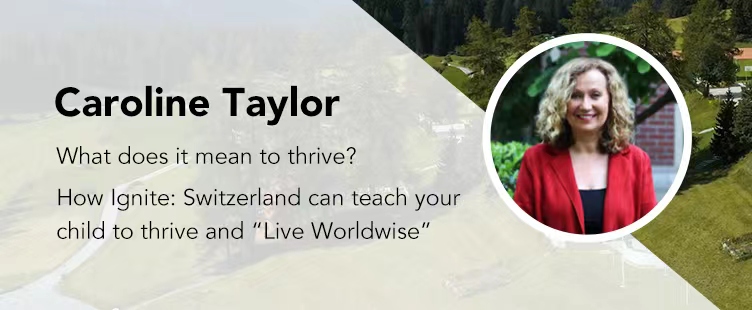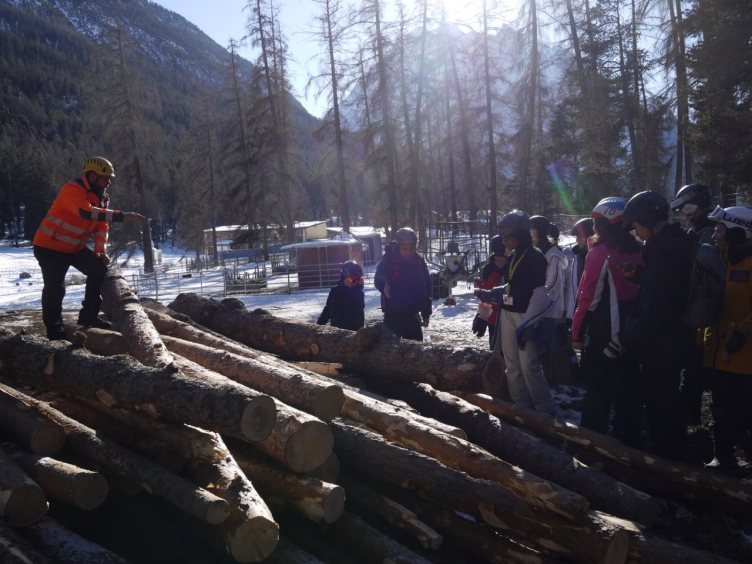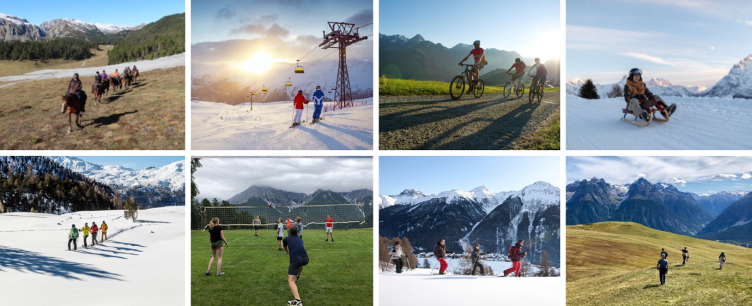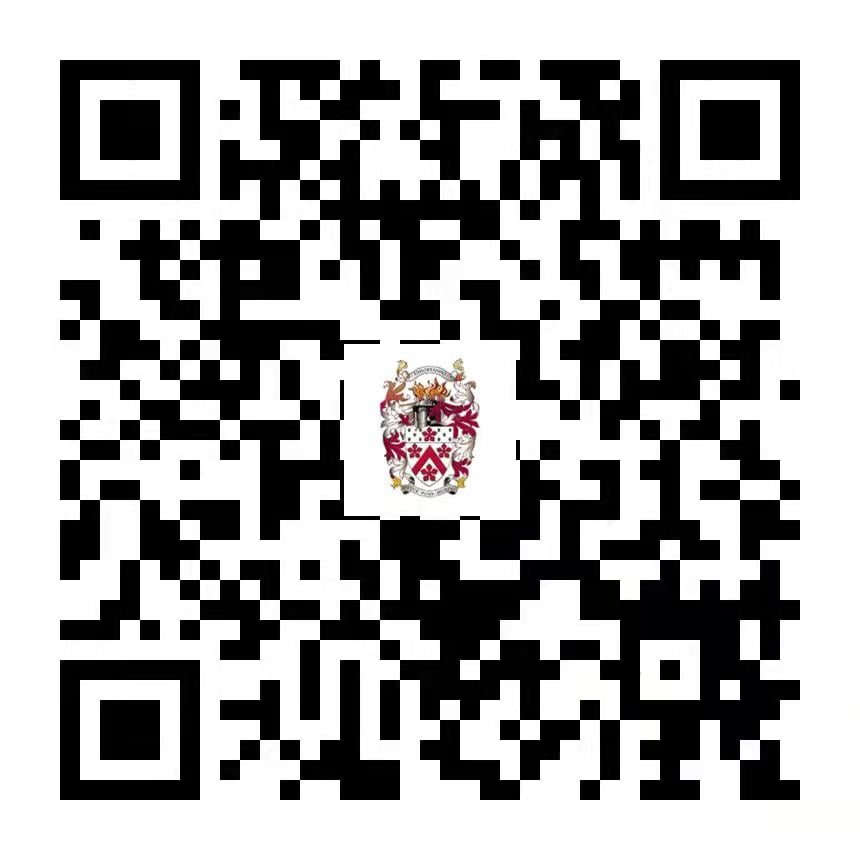Explore Study Abroad in Switzerland: What It Means to Thrive
Ignite: Switzerland, a 12-Week Holistic Study Abroad Programme
Ignite: Switzerland is a customised 12-week immersive and transformative learning programme for our Year 9 students. Unlike traditional study abroad programmes, it integrates a holistic learning approach with social-emotional learning curricula, providing students with transformative experiences in a global setting.
Immersive Learning Across Three Unique Terms
Our study abroad learning programme includes:
- Rock Term
- Snow Term
- Water Term
Held at Hochalpines Institut Ftan AG (HIF), our sister EiM school in Switzerland, Ignite: Switzerland offers a supportive learning environment that promotes emotional well-being and fosters resilience in students.
Expert Leadership in Transformational Education
The Ignite: Switzerland study abroad programme is being led by Caroline Taylor, the former Head of College at Dulwich College Shanghai Pudong. Caroline brings over 20 years of expertise as an experienced international educator and senior leader. In this article, she delves into what it truly means for a student to ‘thrive’ and demonstrates how it is the foundational tenet of the Ignite: Switzerland curriculum.

What Does it Mean to "Thrive" & "Flourish"?
Many parents will have seen the words "thrive" and "flourish" when researching schools and education options for their children. However, more often than not, there is little discussion about what it specifically means.
So, let’s break this concept down to understand the conditions required for them, how it plays into our aspirations for our children to "Live Worldwise", and how Ignite: Switzerland, our study abroad programme, has been designed to give young people the skills to thrive or flourish.
PERMA Model of Well-Being Framework
One framework for understanding what it means to thrive is the PERMA Model of Well-Being [1], developed by Dr. Seligman, a leading authority in the fields of positive psychology, resilience, and wellbeing. The framework identifies five areas—positive emotion, engagement, relationships, meaning, and accomplishment—as necessary for an individual to flourish.
According to this framework, one thrives through cultivating positive emotions such as gratitude, joy, and forgiveness; engaging in tasks by fully deploying skills, strength, and attention to a challenge; nurturing relationships and connections with others; serving something bigger than oneself to derive a sense of meaning; and finally, achieving accomplishments in the form of task completion, skill competence, or mastery.
Education in Motion (EIM) to Live Worldwise
At Education in Motion (EiM), we aspire for our young people to "Live Worldwise," a term that expands on these concepts to reflect our international context. Living Worldwise means:
- Global Citizenship: Being a citizen of the world and being able to connect with other cultures and people in different countries
- Global Awareness: Having a deep understanding of global societal issues and a commitment to helping others through action
- Sustainability and Environmental Protection: Understanding the importance of sustainability and protecting the environment
- Self-Esteem and Community Integration: Having strong self-esteem and identity, and understanding where you fit in your community and the larger world
- Happiness and Harmony: Finding happiness, enjoyment, and harmony with themselves
Through the Ignite: Switzerland programme, we deliver curricula across each of these areas, ultimately helping young people thrive in an internationally enriched setting.

Nurturing Relationships for Global Citizenship
Relationships are a key facet of an individual’s ability to flourish, and as the world becomes more interconnected in every way, we know that open-mindedness, cultural awareness, and global perspectives are more important than ever.
A strong study abroad experience in Switzerland provides "opportunities to interact with people, not just as tourists, and to experience the critical importance of building relationships with people from different countries and cultures" [2] and can "promote intense bonding that leads to lifetime friendships with fellow students and staff and amazing loyalty" [3].
Global Connections and Cultural Immersion
At Ignite: Switzerland, our study abroad programme surrounds students with an international group of learners who are able to view the world and interact with each other through a different lens, promoting a socially and emotionally supportive learning environment. Students gain new perspectives, form lifelong friendships, and enhance collaboration across Dulwich campuses and beyond borders.
Through visits to local businesses, engagement with farmers, and exploration of the school community, they experience education in a different country and embrace a holistic learning approach. This fosters true connections and relationships, helping them become global citizens.

Finding Purpose Through Global Contexts
Finding meaning is another core aspect of thriving, with those who report having a purpose in life being healthier, having greater life satisfaction, and living longer [4]. We know that meaning can be pursued in professions, social causes, creative endeavours, and spiritual belief, as long as it is something that feels bigger than oneself.
The Ignite: Switzerland study abroad programme thus allows students to explore global issues and sustainability as it situates students within larger global contexts.
Empowering Growth Through Study Abroad
The study abroad programme engages with these big ideas while encouraging participation in the wider community and developing a student’s physical, mental, social, and emotional health. Through consistent guidance, students develop independence, confidence, and a sense of responsibility and purpose that may not otherwise be achieved at home.
"Students returning from semester programmes are often refocused and energised academically, socially, and politically—they may become a school’s leading environmental activists or powerful voices on other social or cultural issues" [5].

Building Self-Esteem and Identity Through Engagement
Engagement is when someone fully deploys their skills, strengths, and attention to a challenging task. Deep engagement, sometimes referred to as "flow" (a term first coined by Csikszentmihalyi in 1989) [6], is a gratifying experience where time seems to stop. It is achieved when one’s skills are just sufficient for a challenging activity where there is a clear goal and immediate feedback on progress. People are much more likely to experience this when involved in activities of their own choosing, a concept that has been developed through different aspects of the study abroad programme.
Building Strong Identities Through Engagement and Mastery
Accomplishment or mastery similarly occurs across many areas, including academics, the creative arts, sports, games, and hobbies, but can only follow deep engagement. Both engagement and accomplishment are necessary for thriving. They allow students to develop their identities—what they care about, how they want to spend their time, the skills and knowledge they want to develop, and strong self-esteem through a holistic learning approach and social-emotional learning curricula
Strengthening Character Through Outdoor Learning
In addition to the immersive study abroad programme, Ignite: Switzerland's outdoor learning experiences challenge students physically and mentally, building resilience, determination, and strength of character, mind, and body.

Cultivating Positive Emotions Through Nature and Wellbeing
Research shows how important the natural environment is to health. A 2020 research paper on the health benefits of exposure to woodlands in children concluded that "regular exposure to a natural environment offers children the opportunity to take appropriate risks and gain resilience, confidence, and independence as creative learners" [7].
We also know that positive emotions like interest, joy, compassion, pride, amusement, and gratitude are essential indicators of flourishing. When individuals integrate positive emotions into their daily lives, they become more resilient [8]. The study abroad programme we have designed for Ignite: Switzerland provide opportunities to experience and explore positive emotions in daily life, helping our students build intellectual and psychological resources that protect their wellbeing in a supportive, natural environment.

So what does it mean to thrive?
Thriving, unfortunately, does not come naturally, so when we talk about teaching young people to thrive, we are talking about multiple, interconnected skills on which they can draw.
We want our young people to nurture relationships, experience happiness, find purpose, engage deeply, and develop mastery. We want them to care about the world they live in and to develop the skills and knowledge to make an impact in the areas in which they are most interested. We want our young people to have strong self-awareness and identity. Ultimately, we want them to "Live Worldwise"
As a result, we developed Ignite: Switzerland. This study abroad programme offers a holistic learning approach we believe will provide incredible opportunities for learning and fun, challenge and joy, and most importantly, will give young people the skills to thrive.
REFERENCES
(1) Seligman, M. E. (2012). Flourish: A visionary new understanding of happiness and well-being. New Y0rk, NY: Atria Paperback.
(2) Wang, S., & Peyton, J. K. (2021, May 7). Study abroad for younger students: Benefits, challenges, and solutions (opinion). Education Week. Retrieved July 21, 2022, from https://www.edweek.org/leadership/opinion-study-abroad-for-younger-students-benefits-challenges-and-solutions/2015/06
(3) Gow, P. (2013). Term-Away Programs: A Sampler of Independent School Exotica. Education Week. Retrieved 2022, from https://www.edweek.org/education/opinion-term-away-programs-a-sampler-of-independent-school-exotica/2013/04
(4) Kashdan, T. B., Mishra, A., Breen, W. E., & Froh, J. J. (2009). Gender differences in gratitude: Examining appraisals, narratives, the willingness to express emotions and changes in psychological needs. Journal of Personality, 77(3), 691–730.
(5) Gow, P. (2013). Term-Away Programs: A Sampler of Independent School Exotica. Education Week. Retrieved 2022, from https://www.edweek.org/education/opinion-term-away-programs-a-sampler-of-independent-school-exotica/2013/04
(6) Csikszentmihalyi, M., & LeFevre, J. (1989) Optimal experience in work and leisure. Journal of Personality and Social Psychology, 56(5), 815–822.
(7) Finlay F, Lenton SG173(P) Health benefits of exposure to woodland and the benefits of forest schools for children and those with additional needs. Archives of Disease in Childhood 2020;105:A60-A61. https://adc.bmj.com/content/archdischild/105/Suppl_1/A60.2.full.pdf
(8) Tugade, M., & Fredrickson, B. L. (2004). Resilient individuals use positive emotions to bounce back from negative emotional experiences. Journal of Personality and Social Psychology, 86(2), 320–333.
Connect with us






